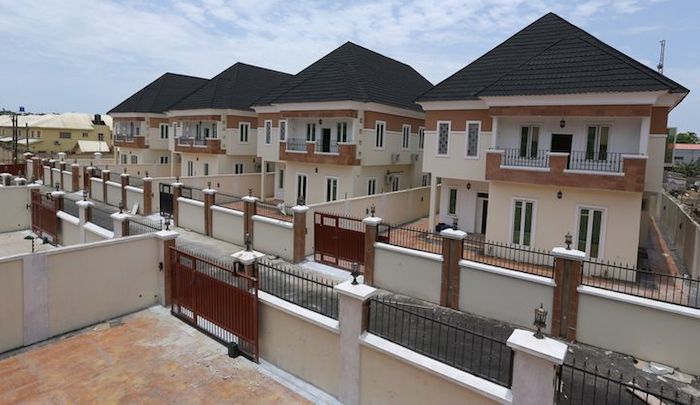
How real estate sector can serve as tool for economic transformation
Housing professionals have expressed optimism that the real estate sector could serve as a veritable tool for economic transformation if the enabling environment is created and synergies between the government and private sector are developed to maximize value creation in the industry.
The operatives argued that there is a connection between land, infrastructural development, technology, data, and property taxation and effort to harness them for overall development.
Speaking at a forum, entitled: ‘Real Estate as Tool for Economic Transformation’ organized by the Alumni Association of Lagos Business School, the Managing Director/Chief Executive Officer, Global Property and Facilities International Limited, Dr. MKO Balogun, said despite the opportunities in the sector, the real estate has remained flat in the last two years in terms of its contributions to the Gross Domestic Product (GDP). He added that while other countries in Nigeria’s category, recorded two digits contributions to the GDP, Nigeria’s real estate had single-digit growth.
Balogun said: “Nigeria has not really explored the potential of the sector. When the Federal Government did its economic sustainability plan after COVID-19, real estate was a major component. Building more houses will transform the economy because it will generate more work.”
“We need to have a conversation with the government on the infrastructure plan before developing housing projects. Most times, the infrastructure we plan for when embarking on development cannot support the development.”
The Managing Director/Chief Executive Officer, Afriland Properties Plc, Mrs. Uzo Oshogiwe, stated that real estate is a major source of value in both developed and developing countries. She pointed out that in the United States, households have $9.6 trillion or 16 percent of their wealth in real estate.
According to her, land and property taxation play, significant roles in the infrastructural development of any country as such should be taken seriously.
“Since the relationship between land, infrastructural development, and property taxation cannot be divorced, it follows that efforts should be made to harness this further. However, precaution should be the guiding principle so as not to discourage developers and investors from related activities. Close to half of the world’s wealth is tied to real estate. It, therefore, remains a veritable source of revenue and a catalyst for economic growth if exploited properly and in the right manner,” she said.
Oshogiwe said there should be tax rebates to cushion the economic effects on the sector. This, according to her, will promote increased investment, drive affordable housing initiatives and create stability in the industry.
She urged the government to plug all loopholes in the tax collection system by establishing a centralized and digitalized system that will be responsible for all real estate payments.
“Real estate is bogged down by too many contentious taxes and charges with ambiguous applications that the government needs to align for the good of the nation's economy, failure to give proper accounts of the taxes collected, and poor infrastructural amenities to support the sector, absence of tax rebates amid inflation and volatile currency is a major contributor to the high cost of housing, which is a militating factor against affordable housing,” she said.
The Chief Executive Officer, Landmark Africa Group, Paul Onwuanibe, stressed that investment in infrastructure, infusion of technology, leisure hub, and mixed-use destination are vital to real estate development, which is a long-term venture.
Onwuanibe said there was a need for collaboration between the government and private sector to improve regulatory activity, as well as training of innovators and artisans, who are the human resources in the sector.
The Founder/ Chief Executive Officer, Estate Intel, Mr. Dolapo Omidire, said the sector has a phenomena impact on any economy, helping people grow their wealth, adding that buying a house could even be the biggest investment an individual would ever make.
Omidire said if the industry is well organized, it will serve as a veritable way to generate revenue for the country. For him, data is vital to the sector because it empowers people and investors to make better decisions, stressing that the deployment of technology in housing will boost access and efficiency of investment opportunities.
Source: Guardian.ng
Similar Topics
US Election Race Intensifies: How Results Could Impact Nigeria’s Real Estate Market As the...
a month ago Read MoreEquatorial Guinea Official Baltasar Engonga Ebang’s Video Sparks Controversy In recent days,...
a month ago Read MoreNigeria’s digital real estate company, Sytemap, has raised concerns over the ongoing trust...
2 months ago Read MoreGovernor Babajide Sanwo-Olu of Lagos State has urged for more investment to address the persistent...
2 months ago Read MoreHousing sector stakeholders have raised concerns that the rising interest rates in the country are...
2 months ago Read MoreLagos State Governor, Babajide Sanwo-Olu, has emphasized the significance of innovation,...
2 months ago Read MoreThe Association of Private Practicing Surveyors of Nigeria (APPSN), a subgroup of the Nigerian...
2 months ago Read MoreNigeria has been admitted into WorldSkills International, marking a historic milestone in the...
3 months ago Read MoreThe Federal Government has launched the Ministry of Finance Incorporated Real Estate Investment...
3 months ago Read MoreThe National Board for Technical Education has inaugurated the Sector Skill Council for...
3 months ago Read MoreThe Environmental Defense Fund has partnered with Africa Practice to combat climate change in...
3 months ago Read MoreThe Minister of Housing and Urban Development, Ahmed Dangiwa, has reiterated the crucial role of...
3 months ago Read MoreThe Real Estate Developers Association of Nigeria has announced initiatives aimed at enhancing...
3 months ago Read MoreThe Global Environment Facility has approved $3.28m to tackle land degradation in Kebbi State under...
3 months ago Read MoreThe commercial real estate market is currently grappling with several major challenges, including...
3 months ago Read MoreReal estate development is a key driver of economic growth in any region, and Africa is no...
3 months ago Read MoreThe Federal Government has signed a Memorandum of Understanding with Shelter Afrique...
3 months ago Read MoreThe Federal Government has issued a 90-day deadline for subscribers of the National Housing...
3 months ago Read MoreThe Minister of Housing and Urban Development, Ahmed Dangiwa, has disclosed that plans are underway...
4 months ago Read MoreA real estate firm, Gestpoint Nigeria Limited, has implored the Federal Government to simplify the...
4 months ago Read More
















